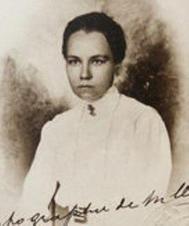
The Story of Anna Hedwig Bull, an Estonian Missionary of the
Armenian Genocide.
By Anna Hedwig Bull
… During those 9 years when I worked with the Armenians I not only saw anything appalling in them but also to my surprise I would note they did not lose their faith in spite of the Muslim yoke they were carrying for centuries, often without having a chance at education, without knowing the Bible; the true Evangelists.
In 1915 during Easter, a terrible calamity happened with the Armenians, I could hear the following words, “Where is your brother Abel, do I hear call of blood from the earth?”
My brother, do these words make us perceive all these differently?
Yes, they were my brothers and sisters, who went to our Lord when the earlier planned massacre reached the city Marash.
I saw rivers of tears; I heard cries of salvage, appeals to God. I could hear their wailing, “My Lord, save us!” Poor suffering Christians condemned to cursing...
Here is another group of refugees, coming down of the mountain. Women, men, old and young, the invalid, the blind, the sick incessantly went along the rocky roads in burning sun. There are more terrible days in store for them, and perhaps death.
The policemen hurry them and they, feeble, all fell on the ground in the cattle yard in Kahn. I saw my brothers and sisters in that condition.
Next day they again were on their way.
A young woman’s corpse lies on the ground with her newly born child, born here at this night; she was not able to continue her way. There is also an invalid; he was not able to continue his way as well. Thousands of people continue their way, hardly dragging their wounded feet, together with other Christians they try to reach Marash. And if your brother is among them, what consolation it is to the soul?
But as Marash is seized at mourning, I saw more and more crowds of people leaving their city.
They walk silently unable even to cry. I see an old man as he casts a parting glance to the city. There is also our Zaruhi in the crowd; she takes her blind mother’s hand that is in the harness tied to the horse saddle, she can neither stand nor walk; she is a blind widow and is being sent. Who will count the corpses of the dead lying along the death road, having lost their children or those who have been kidnapped, crying and calling for their mothers?...
By Anna Hedwig Bull
… During those 9 years when I worked with the Armenians I not only saw anything appalling in them but also to my surprise I would note they did not lose their faith in spite of the Muslim yoke they were carrying for centuries, often without having a chance at education, without knowing the Bible; the true Evangelists.
In 1915 during Easter, a terrible calamity happened with the Armenians, I could hear the following words, “Where is your brother Abel, do I hear call of blood from the earth?”
My brother, do these words make us perceive all these differently?
Yes, they were my brothers and sisters, who went to our Lord when the earlier planned massacre reached the city Marash.
I saw rivers of tears; I heard cries of salvage, appeals to God. I could hear their wailing, “My Lord, save us!” Poor suffering Christians condemned to cursing...
Here is another group of refugees, coming down of the mountain. Women, men, old and young, the invalid, the blind, the sick incessantly went along the rocky roads in burning sun. There are more terrible days in store for them, and perhaps death.
The policemen hurry them and they, feeble, all fell on the ground in the cattle yard in Kahn. I saw my brothers and sisters in that condition.
Next day they again were on their way.
A young woman’s corpse lies on the ground with her newly born child, born here at this night; she was not able to continue her way. There is also an invalid; he was not able to continue his way as well. Thousands of people continue their way, hardly dragging their wounded feet, together with other Christians they try to reach Marash. And if your brother is among them, what consolation it is to the soul?
But as Marash is seized at mourning, I saw more and more crowds of people leaving their city.
They walk silently unable even to cry. I see an old man as he casts a parting glance to the city. There is also our Zaruhi in the crowd; she takes her blind mother’s hand that is in the harness tied to the horse saddle, she can neither stand nor walk; she is a blind widow and is being sent. Who will count the corpses of the dead lying along the death road, having lost their children or those who have been kidnapped, crying and calling for their mothers?...
